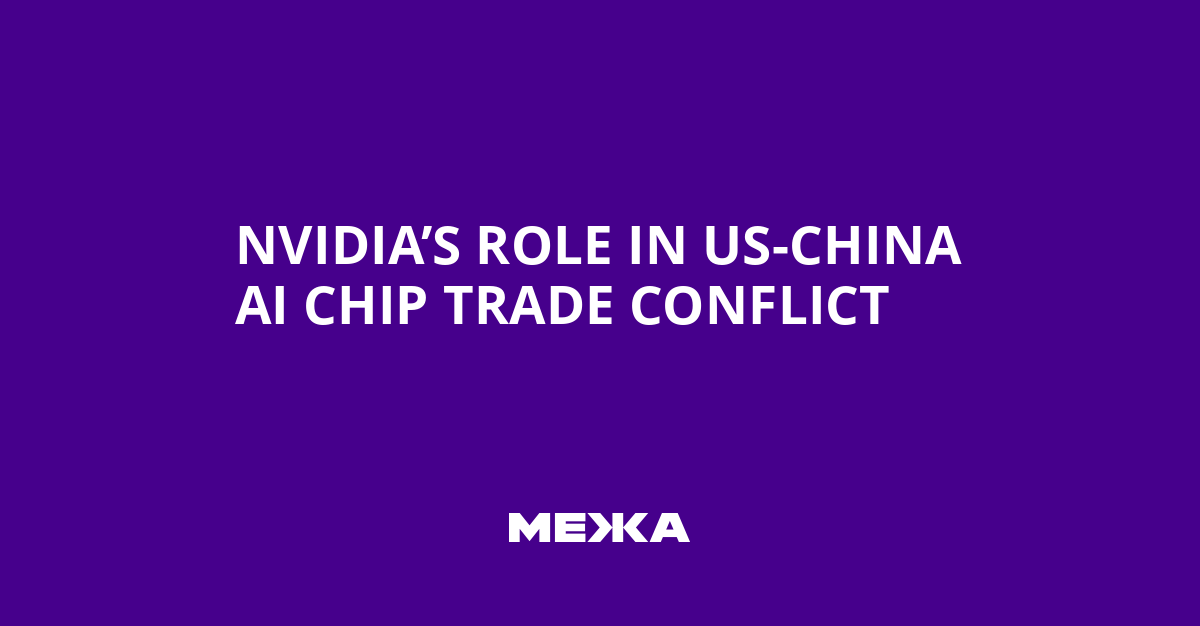Nvidia is a global leader in AI chip manufacturing, and its success has become the focal point of clashes of interest within the framework of the interstate trade tensions between the United States and China. The Santa Clara, California-based company, whose market capitalization is estimated to approach five trillion dollars, is rapidly growing thanks to chips that power large data centers used by various tech giants, including OpenAI and other players in the AI market.
Such advanced Nvidia technologies have become one of the tools in the trade confrontation between the United States and China, which is unfolding against a backdrop of tariff disputes and controversies over rare earth materials and export controls for chips. In the Chinese market, Nvidia accounted for about a quarter of GPU sales, creating significant risks for Chinese demand in the event of tighter export restrictions and increasing attention to possible ways to circumvent rules in a strict trade environment.
Context and Nvidia’s impact on the trade clash
«Nvidia has found itself between two very important things: the trade dispute between China and the United States… but more so, AI has become a matter of national security»
– Luria, Head of Technology Research at D.A. Davidson
The main challenge for the company is balancing reducing risks to supply chains with preserving access to markets. Nvidia CEO Jensen Huang emphasizes that a full ban on AI chip sales does not align with global development interests, as it could push Chinese developers to create their own alternative solutions and reduce market openness.
Huang, 62, was born in Taiwan and moved to Tacoma, Washington at the age of nine. In 1993 he founded Nvidia together with Stanford University; the company began as a graphics-focused player, but later broadened its focus to graphics processors for artificial intelligence.
According to the Bloomberg Billionaires Index, Huang’s net worth is approaching tens of millions of dollars, and he has become a “rock star” in the Taiwan region thanks to successes in the AI chip field. He previously worked on microprocessor development at AMD.
«It’s very unusual to have someone who started from a very small tech startup and grew to such an extraordinary level of success as Nvidia has achieved»
– John Villasenor, Senior Fellow at the Brookings Institution and professor at the University of California, Los Angeles
Nvidia powers data centers that support AI technologies and has become one of the leading suppliers of the relevant chips. The company said it intends to invest substantial funds in the AI ecosystem, including discussing cooperation with leading platforms and infrastructure partners to provide data centers with chips for training and deploying models in the coming years.
Nvidia competes with AMD for contracts with key partners, notably in the use of chips for large training centers and in extreme examples of partnerships with various players in the AI and cloud services sectors.
«Competition has certainly already emerged. Customers will choose the best technology stack to run the most popular commercial applications and open models. We will continue to work on trust and support developers worldwide»
– Nvidia spokesperson, CNN
The U.S. government is tightening export controls on technology to China to limit access to the most advanced AI developments. In April, sanctions were broadened, including certain Nvidia chips, including the H20 model, within broader trade policy actions.
Such restrictions sparked protests in Beijing, where China responded with limits on imports of American chips. Although the White House recently reviewed some positions, tensions between the two countries remain high and affect the global tech ecosystem.
«Do you want to sell to the Chinese so much that their developers become dependent on the American technology base?»
– Howard Lyutnik, Trade Minister
In August the United States allowed limited sales of chips to China under agreements with American manufacturers. According to the administration, Nvidia and AMD could allocate a portion of profits from sales in China in response to export licenses that open access to specific chips under regulatory rules. Beijing continues to reassess its positions and consider possible options to preserve competitive advantages within global trade.
Despite these steps, China remains concerned about access to leading technologies, and tensions between the sides continue to be one of the most noticeable factors shaping the global AI chip production landscape. Experts say that tightening control over access to Nvidia products could have dual effects: on one hand, increasing the reliability of the export regime; on the other, risking the pace of innovation on a global scale.
«The main question is whether tightening global controls on access to Nvidia’s products will be counterproductive, as it could force other countries to accelerate their own pace of innovation»
– An Expert
Recent news indicates that discussions around regulatory policy and the global supply chain continue. In the context of changes in the chip market, Nvidia remains a key player, whose decisions influence the strategies of many companies developing artificial intelligence around the world. This story is updated with new data and analysis from leading media and industry experts who monitor developments in the United States, China, and globally.
The work on this material was also carried out by media-market specialists and analysts who focus on Nvidia’s role in the modern global technology economy and the evolution of regulatory practices in the high-tech sector.
